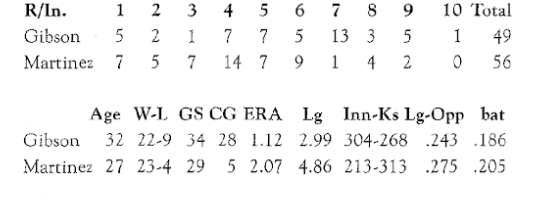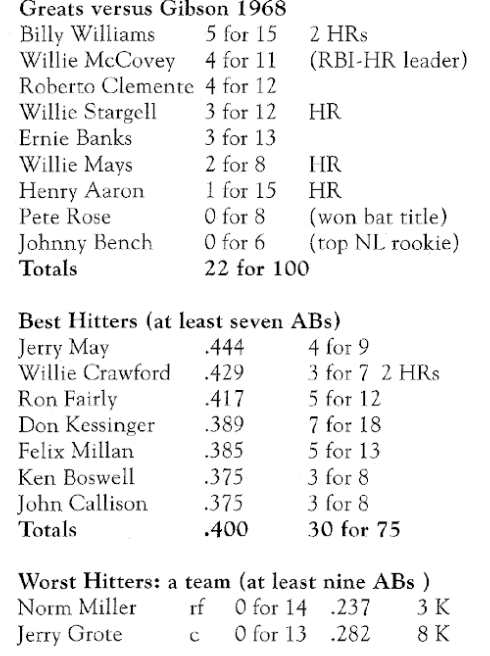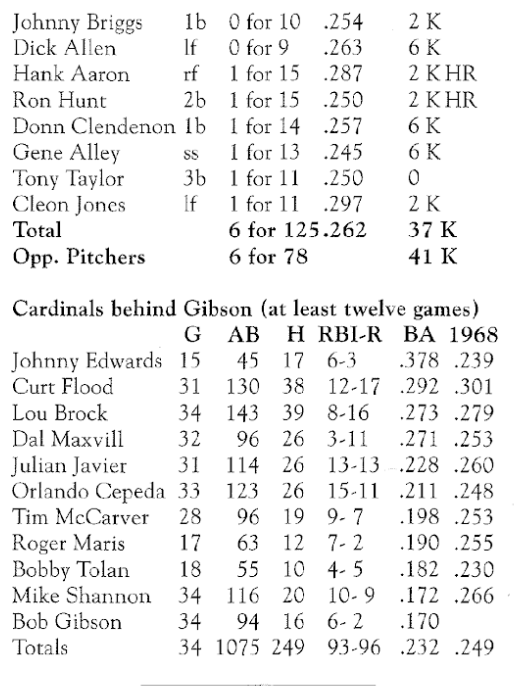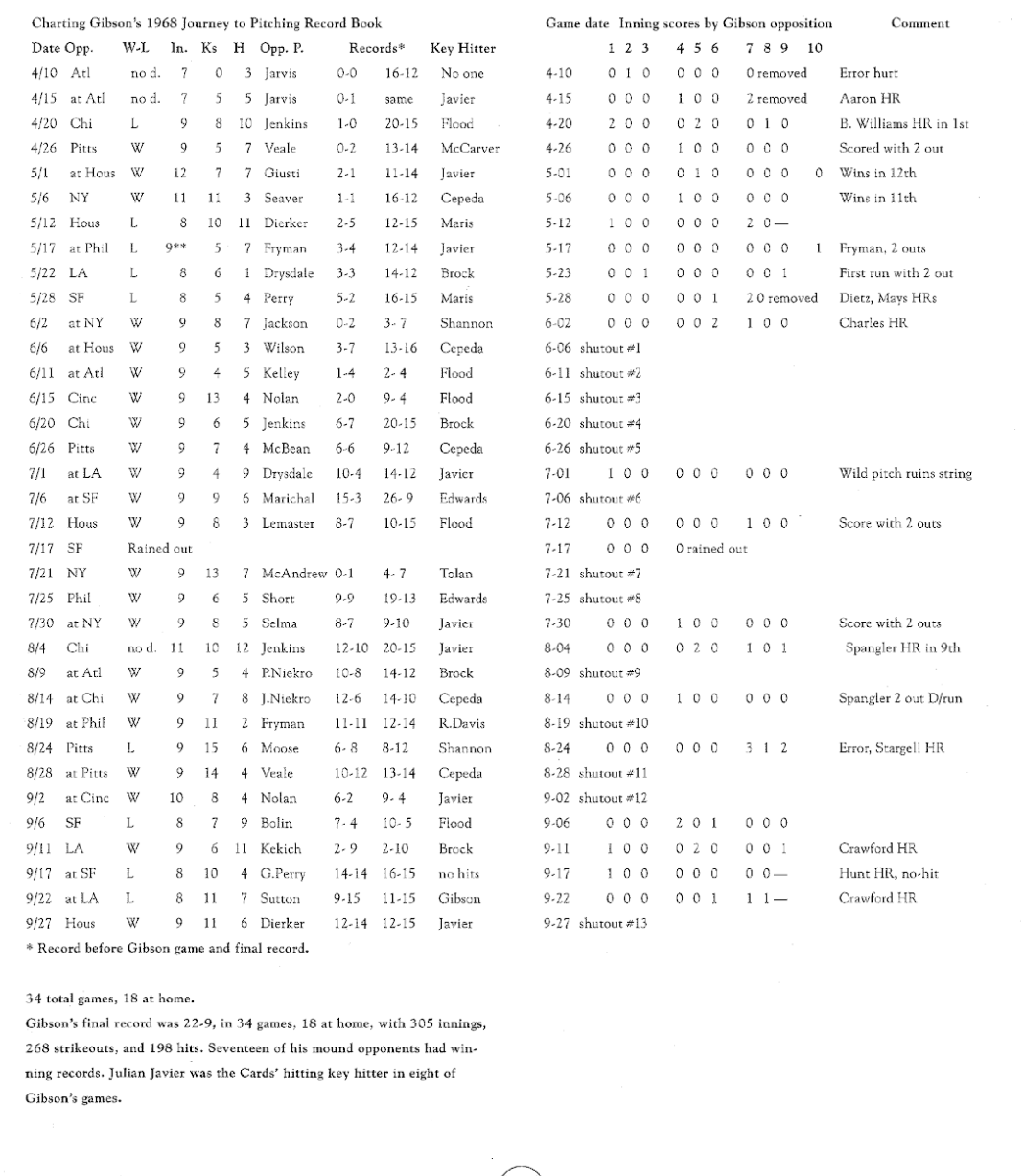Chronicling Gibby’s Glory: Bob Gibson’s amazing 1968
This article was written by Dixie Tourangeau
This article was published in 2000 Baseball Research Journal
For baseball fans, three things stand out from the 1968 season: Detroit’s comeback victory in the World Series, Denny McLain’s 31-6 record, and Bob Gibson’s incredible pitching journey through 34 National League starts that generated his famed 1.12 ERA. It’s Gibson’s performance that most amazes fans today. Except for a wild pitch and a “just fair” double, it could have been even more spectacular than it was.
Plenty of other diamond events occurred in 1968, but world happenings and especially major domestic traumas seemed to subdue interest in the season while it was being played out. Even three decades later old baseball minds remain a little cloudy on many particulars. The Year of the Pitcher was cloaked in war, political upheaval, assassinations, and riots. Its baseball milestones are recalled easily only by those who focused on a certain team or player during the social turmoil. Don Drysdale eclipsed icon Walter Johnson’s scoreless inning record between the assassinations of Dr. Martin Luther King and Robert Kennedy. In fact, his two starts to approach and then break the record perfectly skirted the RFK tragedy. Don hurled his sixth shutout in Los Angeles just hours before the June 5 (after) midnight shooting and broke Johnson’s record just hours after the Arlington Cemetery burial on June 8. Kennedy was said to have mentioned Drysdale’s feat in his speech after winning the California primary.
Giant rookie Bobby Bonds’ first hit was a grand slam. Earl Weaver took over the Orioles. Mickey Mantle took his last bows, as did Elston Howard with Boston. Frank Howard, who had Triple Crown numbers in mid-June, hit a record ten mammoth clouts in a week and Gaylord Perry and Ray Washburn threw back-to-back no-hitters at the ‘Stick. Boston’s 1967 Triple Crowner Carl Yastrzemski, hitting just .280 after June 10, rallied in September to make .301, the lowest batting title finish ever. Runner-up Danny Cater rallied for a .290 mark. Neither league had much of a pennant race, although the Cardinal-Tiger Series did make up for a lack of June to September drama.
Gibson’s dominance has been discussed before by SABR writers, but only as it measured up to other super pitching achievements of this century. Here I chart Gibby’s start-after-start excellence, bringing back all the names and circumstances you may have missed in the original go-around.
Season opens badly
St. Louis began the year as defending World Champs thanks to Gibson’s three wins over Boston in the ’67 Series. At thirty-two, he opened his eighth full season, the last five of which totaled 91 wins and 52 losses. On April 10 Atlanta’s Braves were at St. Louis a day after the scheduled date because of Dr. King’s burial. After three days of riots, troops patrolled outside DC Stadium, Tiger Stadium, and Baltimore’s Memorial Stadium, but things were a bit calmer a few blocks west of the Mississippi.
Gibson left in the eighth inning down 1-0 to Pat Jarvis, who soon lost to Washburn, 2-1, in the ninth. The run Gibson gave up was unearned. Five days later in Atlanta, Jarvis lost to reliever Joe Horner, 4-3, as Gibby exited after seven frames, down 3-1 on a Hank Aaron home run. Back in St. Louis, Ferguson Jenkins hurled a 5-1 win for the cellar-dwelling Cubs, beating Gibson thanks mainly to Billy Williams (double, homer, three RBIs).
After beating Pittsburgh’s Bob Veale, 2-1, on home runs by Orlando Cepeda and Tim McCarver, Gibson outlasted the home Astros, 3-1, in twelve innings on Julian Javier’s triple (run, RBI). Another royal duel followed at Busch Stadium on May 6, as Tom Seaver lost to Gibby, 2-1 (Lou Brock triple, Cepeda single), in the eleventh inning.
Gibson then lost four straight games, allowing a total of nine runs. One loss was to Phillie Woody Fryman, who singled and scored the winning run in the tenth inning (1-0) on a Bill White single. Another loss, 2-0, was to Drysdale, then about half way to breaking the scoreless inning record. Wes Parker’s third-inning RBI double with two out was the only run off Gibson on that cold, wet night. Visiting Giant Gaylord Perry then beat him, 3-1, on late home runs by Dick Dietz and Willie Mays. Gibson was pitching much better than his 3-5 record indicated, and things were about to turn around for the St. Louis fireballer.
St. Louis had lost eleven of fourteen games until they arrived in New York to face the upstart Mets. They won a muddy June 2 doubleheader, with Gibson capturing the first game, 6-3, on two RBIs each from Mike Shannon, Dick Simpson (homer), and McCarver. The Cards nudged back into first and the Mets slipped to last, only seven games behind. Then came five straight shutouts, with Robert Kennedy’s murder between the first and second. At the same time, Drysdale’s run of six shutouts and 58 scoreless innings ended on Phillie Howie Bedell’s only RBI of the year (a sacrifice fly).
Gibson’s real dominance began at Houston’s Astrodome on June 6, where he tossed a three-hitter and won, 4-0, behind Cepeda. Host Atlanta fell next, 6-O, on five hits. The Reds’ Gary Nolan matched Bullet Bob for five innings before the fleet-footed Cards beat him, 2-0, (Cincy got four hits). Nemesis Chicago was next as Gibson beat Jenkins, 1-0, on five hits. Poor Fergie gave up only four safeties, but lost as Chicago was sinking in its own scoreless quagmire of 46 innings. Bob’s fifth whitewash beat Pittsburgh, 3-0, on four hits. He allowed an average of four hits and struck out an average of seven batters during the skein. His own consecutive scoreless inning streak then stood at 47.
Wild frustration
On July 1 came a Gibson-Drysdale showdown at Chavez Ravine before 54,107 fans. In his previous start, the Dodgers’ Big D no-hit the home Giants into the seventh while posting his tenth victory. In the bottom of the first inning Len Gabrielson and Tom Haller (off Javier’s glove) singled with two down.
With Ron Fairly at bat, Gibson uncorked a wild pitch, which bounced off umpire Shag Crawford and away from substitute catcher Johnny Edwards. Gabrielson dashed home with what proved to be the Dodgers’ only tally. Edwards later said the ball might have been wet from the outfield grass, and took some of the blame though he did ask the umpire to dry it.
Fairly said it was one of the hardest thrown balls he had ever seen. Drysdale lasted into the seventh as the Cardinals won, 5-1, behind the bats of Curt Flood and Brock. Each hurler left with a 10-5 mark, but Gibson’s goose egg run had ended at 47.
Here the “couldas and shouldas” begin, because Gibson shut the Dodgers out for the last eight innings, then blanked the Giants at Candlestick, 3-0. He beat Juan Marichal, who had the best NL record at 15-3. Edwards’ first-inning blast won the game, almost a “makeup” for the previous game’s miscue. Back home at Busch, Bob destroyed Houston, 8-1, allowing only a two-out, seventh-inning, RBI double to Denis Menke that was described as “fair by inches.”
On July 17 in St. Louis, a heatwave induced thunderstorm washed out all the numbers of a 6-0 lead the Card ace held over the Giants and Mike McCormick. Gibson then shut out both the Mets and Phillies. Making his debut, rookie Jim McAndrew took the Met loss, 2-0, as both runs were driven home by Bobby Tolan (inside-the-park home run, double). Chris Short took the 5-0 Phillie loss, as Edwards and Gibson himself starred at the dish.
Bob had amassed eight shutouts in ten games, with just two solo runs scoring, each with two outs. Subtract those and he would have had compiled ten consecutive whitewashes and more than ninety blank innings. At Shea Stadium he posted another near-shutout, 7-1. This time an Ed Kranepool two-out double plated Ed Charles in the fourth. St. Louis was 26-21 when Gibson’s roll began and 78-43 when he next failed to win (52-22). The National League race was over.
Facing Jenkins again, at Busch, Gibson (then 17-4) was proven human. Blowing a 3-0 lead against the club that hit him best in 1968, Gibson gave up another home run to “Sweet Billy” Williams and the tying home run to Al Spangler (his first of just two that year) on the first pitch of the ninth inning. Bob tossed eleven innings and gave up twelve hits, but avoided a decision. The Cards lost in the twelfth, 6-5. Through four innings of that game Gibson had allowed three runs in 105 innings — each after two were out.
In Atlanta Gibson continued his nasty mastery. He blanked the Braves and Phil Niekro, 1-0, then beat the Cubs at Wrigley, 3-1, losing a shutout to yet another two-out run, as Jim Hickman knocked home Spangler, who had doubled. Cepeda had two RBIs for the winners. Bob then paid back Phillie Fryman for that earlier loss, beating him, 2-0, while whiffing Richie Allen four times and Bill White thrice. Substitute outfielder Ron Davis, who had come over from Houston and rarely played for St. Louis, chose that night to carry a huge bat and knocked home both runs. More importantly, this was Gibson’s 15th consecutive win, allowing hits only to reliever John Boozer and pinch hitter Johnny Callison.
On August 24 at Busch came Gibson’s worst defeat of the season — in all respects. It was as frustrating as the wild pitch in Los Angeles, as he lost to Pittsburgh, 6-4, giving up more runs than he did in any other 1968 game, and blowing a four-run lead. Gibson was coasting along with a shutout until Willie Stargell’s three-run shot in the seventh. It was the only three-run inning off Gibson all season and it began with an Orlando Cepeda error. The Card ace fanned his season high of 15, but a second error (Maxvill throw) after Stargell doubled in the ninth cost him two (unearned) runs and a sixteenth straight victor. Reliever Elroy Face, the fifth Pirate hurler, was the winner as Matty Alou chipped in a run and an RBI.
Four days later in Pittsburgh, a somewhat miffed Gibson shut out the Bucs, 8-0, on Cepeda and Julian Javier home runs and his own two RBIs. He struck out fourteen while setting the Cardinal team record of eleven shutouts. In his next start in Cincinnati, Gibson dueled Gary Nolan for nine scoreless innings. Javier’s solo clout in the tenth off Ted Abernathy gave Gibby a 1-0 win, his twentieth-and his twelfth “Chicago.” It also could have been number eighteen in a row, except for Stargell’s two clutch swings.
Gibson faced San Francisco’s Bob Bolin next in St. Louis. Bolin would finish the season with the second best National League ERA at 1.99. West Coast Bob managed a 3-2 win on hits from Jack Hiatt and Jim Ray Hart. After beating Los Angeles, 5-4, Gibson took on Gaylord Perry at the ‘Stick. As it turned out, the Giants were the only team to hold an edge on Gibby (three wins, one loss) during his extraordinary campaign, and Perry’s 1-0 no-hitter was a case of Bob getting a dose of his own unhittable medicine. Ron Hunt’s first-inning, one-out home run (only his second of the year, the other was off Cub Bill Hands) won the game. Gaylord was the only pitcher to best Gibson twice in 1968, allowing a total of two hits in two games his best two performances. The next day Card Washburn no-hit the Bay hosts.
Gibson ended the year first by losing at Los Angeles, 3-2, as Willie Crawford homered for a second time off him, then beating visiting Houston’s Larry Dierker, 1-0, on a Curt Flood RBI. It was his thirteenth shutout and still ranks second in the twentieth century only to Grover Alexander’s honored mark of sixteen in Deadball 1916.
In his final ten starts of the year, Gibson averaged ten Ks per game. Nine times during the year he gave up a single run in nine innings. Six of those tallies came with two outs. Four players — Hunt, Dietz, Spangler and Charles — hit their only career homers off Gibson in 1968. Gibby walked Giant Diet four times, the most of any batter he faced that year.
Inside numbers
As you can see in the following inning-by-inning run chart, Gibson had a rough seventh frame, allowing his most runs by far and six of the eleven homers he gave up. In first innings, he gave up three blasts and that infamous wild pitch that ruined the scoreless streak. He went twenty-seven straight games without allowing an earned run in the first inning. Though Marichal pitched more innings and won an National League-high 26 games, Gibson got all the votes for the Cv Young Award and beat out Pete Rose for MVP.
Partly prompting this flashback description was the 1999 performance of Boston’s Pedro Martinez and his similar dominance over the American League. In some ways Gibson’s feat was more pronounced, in other ways not as much. Gibby pitched to pitchers while Martinez battled Designated Hitters; Pedro had more offense to deal with, but Gibson had more patient hitters and more quality mound foes. Bob completed many more games, while a closer usually came on for Martinez. Comparisons are many and most are futile. Both years are simply fantastic.
With the immense help of Retrosheet, I list below the statistics of batters who faced Gibson in 1968. Astro Rusty Staub had to face Gibby the most, but he did extremely well (7 for 20, .350). Cub Kessinger matched him for the most hits. Don’s Wrigley mate Billy Williams did the most damage with two home runs and four RBIs, going 5 for 15. Following are lists of interesting special categories illustrating Gibson’s 1968 mastery.
DIXIE TOURANGEAU lives in Boston and works as a National Park Service ranger when not writing about baseball.
Acknowledgments
Some details of this story could not have been disclosed without the amazing resources provided by Mr. Home Run Dave Vincent, Mr. Retrosheet Dave Smith and senior researcher Scot Mondore of the National Baseball Library.
(Click image to enlarge)






